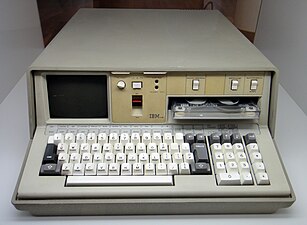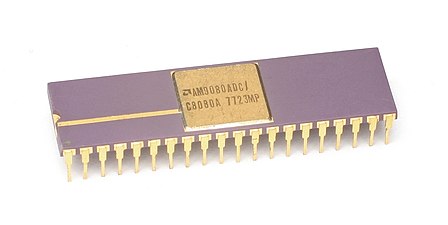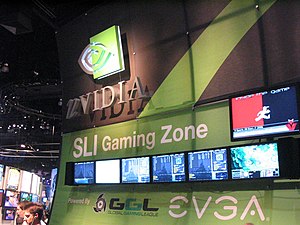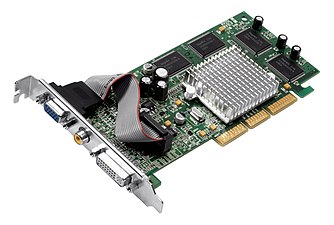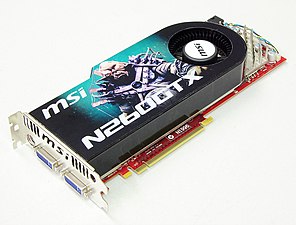History of video games/Computer games
Early Computer Games
[edit | edit source]See the chapters early games and Dr. Nim for early examples of computer games.
1970-1979
[edit | edit source]-
An IBM 5100 portable computer. While not used for gaming, it had a large influence on later designs.
-
Common computers released in 1977, the Commodore PET 2001, the Apple II, and the TRS-80 Model I.
-
An Ohio Scientific Challenger 2P
-
AMD 9080 Processor
Games
[edit | edit source]1980-1989
[edit | edit source]Notable Devices of the 1980's
[edit | edit source]CPUs
[edit | edit source]- 16 bit Intel 80286 (286) - 1982-1991
- 32 bit Intel 80386 (386) - 1985-2007
- 32 bit Intel 80486 (486) - 1989-2007
Regional Computers
[edit | edit source]In the 1980's there was a rivalry between Iraqi users of the Al Warkaa and the Sakhr 170 home gaming computers.[1][2]
In Wales, Dragon computers were popular.[3]
Gallery
[edit | edit source]-
ATI Hercules Graphics Card (1986)
-
AdLib Music Synthesizer Card (1987)
-
The Compaq Portable, a popular computer of the 1980's.
1990-1999
[edit | edit source]By 1990 well used dithering was being used in EGA games to create the illusion of better colors.[4] From the early to late 1990's Color Cycling, the shifting of a palette on a still image, was used to produce resource efficient animations in computer games.[4][5]
The 1990's saw the first common graphics cards, as well as the first common 3D API's for graphics cards such as Glide.
The introduction of CD-ROMs was initially seen as a way to reduce costs and piracy compared to floppy disks,[6] though pirates quickly gained familiarity with the new format.[7]
In 1994, the first Dreamhack was held in Malung, Sweden.[8]
In 1996 the Marine Doom is made for US military training, a notable early use of FPS games for military training.[9]
The Nvidia GeForce 256, considered as the world's first GPU, was released in 1999. It offered a huge improvement in 3D graphic capabilities.
-
The popularity of Doom was so massive that for a while first person shooters were commonly called "Doom clones"
-
The Quake engine spawned a number of decedent engines.
2000-2009
[edit | edit source]Valve launches Steam on September 12th, 2003.[10]
Audio Cards remain popular till the end of the decade in many high end gaming rigs, along with brief experiments in gaming themed network and physics acceleration cards.
Events
[edit | edit source]-
Dreamhack 2004 LAN party
-
PAX 2006 computer gaming.
-
A Korean PC Bang in 2006.
-
NVIDIA SLI at E3 2006
Components
[edit | edit source]-
GeForce FX5900
-
Powercolor Radeon 9000 AGP video card.
-
Nvidia 7900GS video card.
-
Nvidia 260 GTX. This card shows a trend where static 3D renderings were printed on the card.
-
A Turtle Beach Catalina sound card.
-
A Western Digital VelociRaptor in 2008.
-
A Linksys WRT54GS Router, common during the early to late 2000's.
-
2009 LCD shutter glasses for 3D gaming.
2010-2019
[edit | edit source]Rise of Steam
[edit | edit source]We think there is a fundamental misconception about piracy. Piracy is almost always a service problem and not a pricing problem. If a pirate offers a product anywhere in the world, 24 x 7, purchasable from the convenience of your personal computer, and the legal provider says the product is region-locked, will come to your country 3 months after the US release, and can only be purchased at a brick and mortar store, then the pirate's service is more valuable.
In 2011 Valve identifies game piracy as a service problem.[13] In 2013 Steam distributed 75% of digital games on PC.[14]
In 2015 Steam and Bethesda briefly introduced paid mods as a feature, before quickly withdrawing it in response to widespread criticism.[15][16]
Ray-tracing games started in 2018 and ray-tracing cards were released to be capable of ray-tracing in supported games. The first ray-tracing graphics cards were Nvidia RTX 2060, 2070, 2080, and Titan RTX.
2010's gallery
[edit | edit source]-
AMD booth at E3 2011
-
NVIDIA GTX 1070 Founders Edition
-
A Blizzard Battle.net Authenticator token in 2016.
2020-2029
[edit | edit source]The COVID-19 pandemic caused a shortage of computer parts.[17] Despite this the Folding@Home distributed computing project reaches quickly 1.5 Exaflops of capability as thousands of PC gamers donate unused cycles from their computers to tackle biomedical research in the fight against COVID-19.[18]
The Trump Administration began enforcing a new tariff on computer components from China near the end of it's term in mid January 2021, causing GPU prices to significantly increase, sometimes by several hundred dollars.[19][20]
Some manufactures experimented with PCs in handheld console formfactors.[21] In 2022 Steam released the Steam Deck, which is a handheld console that runs PC games.
In 2022 Intel released its first graphics cards: the Arc A750 and A770. These GPUs supported RTX 3060 performance for cheaper prices in games, especially DirectX 12 ones. DirectX 9 support was improved on these GPUs in 2023.
2020's gallery
[edit | edit source]-
Nvidia GeForce RTX 4090 Founders Edition
References
[edit | edit source]- ↑ "History of computers in Iraq". Retrieved 8 November 2020.
- ↑ Byford, Sam (1 May 2012). "Al-Warkaa: the Iraqi home computer series that took on the MSX 'enemy'". The Verge. Retrieved 8 November 2020.
- ↑ Evans, Jason (23 December 2019). "When a Welsh computer was the must-have Christmas gift" (in en). WalesOnline. https://www.walesonline.co.uk/news/wales-news/dragon-computer-32-64-vintage-17433026.
- ↑ a b "8 Bit & '8 Bitish' Graphics-Outside the Box". Retrieved 17 November 2020.
- ↑ "Old School Color Cycling with HTML5 EffectGames.com". www.effectgames.com. Retrieved 17 November 2020.
- ↑ "WATCH OUT FOR THE CD-ROM HYPE Some industry executives tout the luminescent disks as the hottest thing since the VCR. But that view rests on seven myths you should know about. - September 19, 1994". archive.fortune.com. Retrieved 11 December 2020.
- ↑ D'Alessio, Vittoria. "Chinese pirates target software on CD". New Scientist. Retrieved 11 December 2020.
- ↑ "Dreamhack on Twitter". Twitter. Retrieved 3 November 2020.
- ↑ Riddell, Rob. "Doom Goes To War". Wired. https://www.wired.com/1997/04/ff-doom/.
- ↑ Sayer, Matt; Wilde, Tyler (12 September 2018). "The 15-year evolution of Steam". PC Gamer. Retrieved 14 November 2020.
- ↑ "Valve's Gabe Newell Says Piracy Is a Service Problem".
- ↑ "Gabe Says Piracy Isn't About Price - IGN".
- ↑ Cifaldi, Frank. "Valve: Piracy Is More About Convenience Than Price". Retrieved 14 November 2020.
- ↑ "Valve Lines Up Console Partners in Challenge to Microsoft, Sony". Bloomberg.com. 4 November 2013. Retrieved 11 December 2020.
- ↑ Prescott, Shaun (27 April 2015). "Valve has removed paid mods functionality from Steam Workshop". PC Gamer. https://www.pcgamer.com/valve-has-removed-paid-mods-functionality-from-steam-workshop/.
- ↑ McWhertor, Michael (27 April 2015). "Valve kills paid mods on Steam, will refund Skyrim mod buyers" (in en). Polygon. https://www.polygon.com/2015/4/27/8505883/valve-removing-paid-mods-from-steam.
- ↑ Leon, Nicholas De. "How to Buy a Computer During the Great Laptop Shortage of 2020". Consumer Reports. Retrieved 28 November 2020.
- ↑ Merritt, Rick (1 April 2020). "NVIDIA Blogs: Virus War Goes Viral: Folding@Home Gets 1.5 Exaflops to Fight COVID-19". The Official NVIDIA Blog. https://blogs.nvidia.com/blog/2020/04/01/foldingathome-exaflop-coronavirus/.
- ↑ "With Tariffs Back in Place, GPU Vendors EVGA, Zotac Raise Prices on Graphics Cards" (in en). PCMAG. https://www.pcmag.com/news/with-tariffs-back-in-place-gpu-vendors-evga-zotac-raise-prices-on-graphics.
- ↑ Hollister, Sean (13 January 2021). "Sure enough, EVGA and Zotac have raised prices on the Nvidia RTX 3080 and beyond" (in en). The Verge. https://www.theverge.com/2021/1/13/22228470/nvidia-evga-zotac-raise-prices-rtx-3080-3070-3060-3090.
- ↑ Palladino, Valentina (6 January 2020). "Dell’s new Concept UFO puts PC gaming on a Nintendo Switch-like device" (in en-us). Ars Technica. https://arstechnica.com/gaming/2020/01/dells-new-concept-ufo-puts-pc-gaming-on-a-nintendo-switch-like-device/.

